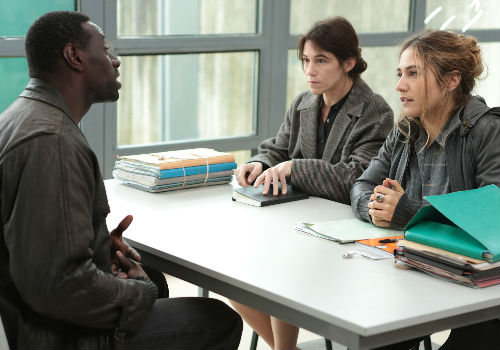
We all need to feel like we belong somewhere.
It’s an extricable part of the human experience, the burning imperative to not just simply survive but to feel like there is a place where we are valued, loved and where we can rest and recuperate from the vicissitudes of life.
But as the joint writer/director team of Olivier Nakache and Eric Toledano, who had a major worldwide hit three years with their deeply touching film The Intouchables, rightly and deftly observe, it’s a human right cruelly denied to a host of people, for reasons as varied as the individuals themselves.
In the case of Samba Cissé (The Intouchables‘ Omar Sy), who left Senegal ten years ago to provide for his family after the violent death of his father, the sense that he belongs in his adopted home hangs by an all-too-easily cut thread, one which is severed one day when he presents the Immigration department with a contract from his employer, an employment offer he optimistically hopes will legitimise his presence in France.
Rather than being welcomed with open arms however, Samba is arrested, placed in a detention centre near the airport, where he meets two charity case workers, the effervescently officious Manu (Izia Higelin) and the ill-at-ease with life Alice (Charlotte Gainsbourg), herself at a life-shattering loss after a nervous breakdown has forced her to step away, albeit temporarily, from her high-flying corporate career.
Two lost souls adrift, with no assurance that either will find the security of belonging they crave, they form the heart of Samba, a film which explores the thorny and all too human issue of illegal immigration in a way that is neither preachy nor moralising.

As light hearted and charming as it is grimly perceptive, Samba makes fine use of black humour and Sy’s gift for verbal and physical comedy to leaven the all too serious issues that thread their way through the narrative with nuanced assurance.
Samba is hardly an activist film but then nor does it set out to be; what it does, and does marvellously well, is remind us that there are real people with real rights and needs at the centre of this important and growing issue.
They may come across as faceless statistics, all the better for xenophobic threat-mongering politicians and interest groups to use for their own purposes but as Nakache and Toledano emphasise in ways both touching and non-strident, rendering them this way is a heartless disservice to people who simply want to find a place to call home.
They expose too the hypocrisy of many countries like France, and yes Australia, who demonise the illegal populations in their midst while relying on them to keep the wheels of industry and commerce swiftly and soundly turning.
What could quite easily have become a clumsy, noisy polemic against rampant institutionalised injustice instead becomes a beautifully-wrought tale of what happens when two dislocated, displaced people come together and discover that home, all cliches aside, may really be where the heart is.
It sounds like a throwaway rom-com-esque sentiment, ill-suited to the grave discussion underway, but in the hands of Nakache and Toledano, it assumes far more import than some sort of glibly uttered, all too often repeated truism.

What makes Samba such an enjoyable experience, despite the heavy issues at hand, and it’s made abundantly clear just how much these stateless people must contend with day to day from sporadic work opportunities to routine police harassment, is that it is never forgotten at any point that people simply want the chance to laugh, cry, support themselves in ways large and small, and spend time with family and friends.
A number of scenes in the film drive this home eloquently such as any touching upon Samba and Alice’s adorably awkward but growing romance, those that explore their friendships with Manu, and Wilson (Tahar Rahim), the latter a fellow illegal immigrant who pretends to be Brazilian rather than Algerian because women like that better, and most delightfully, a boozy night at the charity’s counselling centre where everyone’s commonly-shared humanity is writ gloriously, and drunkenly, large.
It’s these exquisitely well-rendered moments, often accompanied by the directors’ judicious and infectious use of ’80s funk, that define a film which knows from the start that less is often more when you’re telling stories as powerfully effective as those of Samba, his uncle and Wilson, and yes even Alice, herself all at sea and uncertain of where she’ll finally come to rest.
Most impactfully at the start of the film, we are taken in a swift one take movement that owes much to the inspired cinematography of Stéphane Fontaine, from an almost obscenely lavish Roaring Twenties-themed wedding reception through the kitchens and washing up areas of the function centre until we’re resting firmly in the world inhabited by Samba and so many like him.
It’s an uncluttered, unsentimental but powerful message that the world is not an equal or just place, a message subsequently and quietly reinforced in many ways throughout the film.
It may sound like the worst of treacly greeting card sentiments to say we all share the same humanity but here, presented as an inalienable truth, gritty, real, heartwarming and wonderful all at once, it makes Samba far more of a sophisticated and impacting film that you might first assume it is going to be.